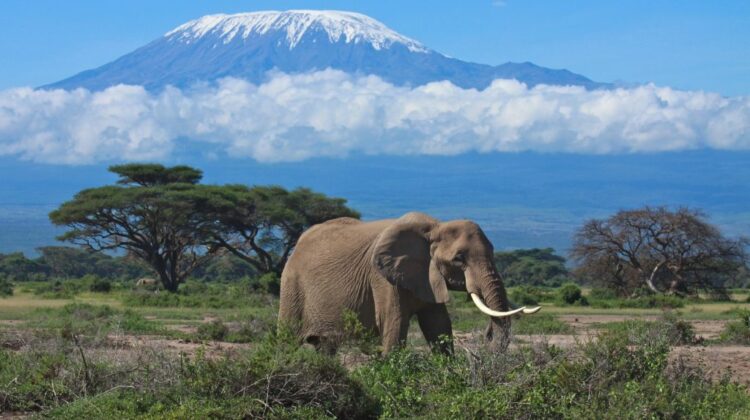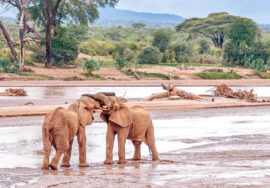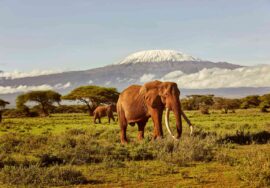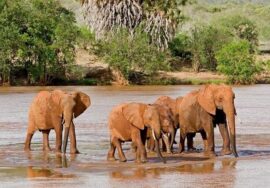
Tsavo East National Park
Tsavo East National Park – Kenya’s Oldest and Largest Safari Destination
Location
Tsavo East National Park is located in Kenya’s southeast near the coast. It is approximately 110 miles from the town of Voi and about 260 miles from Nairobi, Kenya’s capital city. Known as the largest national park in the country, Tsavo East lies in the Taru Desert and borders Chyulu Hills National Park, east of the southern Kenya Rift Valley.
Size
The park covers an area of approximately 5,300 square miles.
History
Although traversed by traders as early as the 600s, Tsavo East National Park was officially gazetted in 1949. The construction of the A109 highway divided the original Tsavo National Park into Tsavo East and Tsavo West. The park is named after the Tsavo River, which flows from west to east through the park.
Entrance Fees & Permits
Entrance fees for Tsavo East National Park are approximately USD $60 per person per day for both day visitors and those staying in camps or lodges inside the park.
Hours of Operation
The park is open daily from 6:00 AM to 6:00 PM.
How to Get There
By Road
Traveling from Nairobi by safari jeep or scheduled transfer involves a 230-mile journey that takes around six hours via the Uhuru Highway and the A104/Mombasa Road. From Mombasa, it’s a 125-mile drive that takes approximately three hours.
By Air
Flights from Nairobi’s Wilson Airport to Tsavo East take about 60 minutes, and around 30 minutes from Mombasa. Guests can fly into Voi Airport and transfer by road for about three hours or fly to Kilaguni or Finch Hattons Airstrips in Tsavo West and transfer by road to Tsavo East.
By Train
Traveling on the Madaraka Express from either Nairobi or Mombasa is a unique experience. The train journey takes about 2 hours and 45 minutes from Nairobi and 1.5 hours from Mombasa. The train stops at Voi Terminal, where lodge or camp representatives meet guests for transfer.
Best Time to Visit
Weather & Climate
Winter, from June to August, is the ideal time for a safari in Tsavo East. The air is dry, vegetation is low, and temperatures are cooler—perfect conditions for wildlife viewing. While early mornings and evenings can be chilly, the days are generally pleasant.
Avoiding Crowds
Peak season attracts many safari-goers, which can lead to crowded game drives. Visiting during the green or low season offers a quieter experience and the chance to witness special wildlife events like birthing seasons or migrations.
Value for Money
Traveling outside of peak season allows visitors to enjoy expert-guided safaris at a lower cost. Knowledgeable guides know the terrain well and can lead guests to the best wildlife-viewing areas during the off-season.
Wildlife and Landscape
Popular Wildlife Sightings in Tsavo East
Tsavo East is famous for its iconic “Red Elephants,” colored by the park’s red soil. Other wildlife includes the Dik-Dik, Lesser Kudu, Gerenuk, and Porcupine. Over 500 bird species have been recorded in the park.
The Terrain
The landscape is mostly flat with open savannah and grasslands, dotted with acacia trees and rocky outcrops. The Yatta Plateau, Lugard Falls, and Aruba Dam are some of the park’s most scenic and wildlife-rich features.
Plan your unforgettable safari to Tsavo East National Park with Adventure In The Wild Safaris and discover the untamed beauty of one of Kenya’s greatest wilderness areas.








